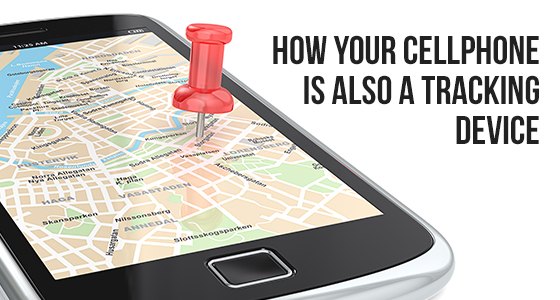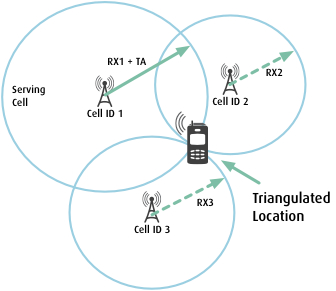2016
How Your Cellphone Is Also A Tracking Device
Tips
Cellular phone tracking is not just a fantasy dreamed up by spy thriller movie directors to make you believe that there is no escape from Big Brother. Big Brother, to a greater or lesser extent, really is tracking you, or at the very least, can do so should they ever feel the need.
The process of determining the position of a cellphone on a map, whether it be stationary or moving can be achieved by either GPS, which most smartphones have automatically included these days, or by checking the triangulation of several radio towers used by the cellphone owner’s network provider. The cell phones GSM is judged by the signal strength of the cell phone to nearby aerials and/or antennas.

How is working Cellphone Triangulation
At UnlockBase we unlock thousands of smart phones around the world every year, in fact more than any other web based remote unlocking service, so we like to keep our customers knowledgeable about the clever technology that comes hidden inside every phone you own.
Sneaky cellphone tracking
Instant messaging apps such as Viber have taken the GPS tracking device a step further by actually providing an accurate location complete with map an address of where your chat buddy is living or working. You may have installed other apps that can enable malicious app writers to intercept or read your emails, your text messages and sensitive information on your phone such as your bank details. If you have clicked OK to a long list of permissions on a newly installed app, delete it!
Cell phone tracking that includes a location gives out the actual coordinates of the cell phone. While the government may or may not be interested in your whereabouts, this feature is more commonly used by your cellphone provider to get an idea of where the cellphone is. Why do they do this? It’s not because they care about your safety or are spying on you. They simply want to know when your cell phone moves into areas where there are extra tariffs applicable. And this usually includes traveling to other countries.
Cell phone tracking that uses GPS is achieved by using a constellation of 27 satellites that orbit our planet. In simple terms, the satellites send out a signal which reveal where they are and when they sent the signal, and the GPS receiver picks up these signals. This information is then used to figure out where the GPS device is in relation to these satellites, and by doing so, accurately works out where it is on the globe. Don’t blame your cellphone for letting people know where you are; the GPS will simply transmit this information to whoever wants to know where the phone is located. And if you think going into the great outdoors will make you harder to follow, think again, GPS tends to work better outdoors.
Scenes showing cellphones being broken in two or thrown into rivers are common place in thriller movies. Ever since Osama Bin Laden and several of his cohorts were traced by their cellphones in the early days of tracking technology, they quickly reverted to a pre-cellular era and delivered all messages by human couriers.
What does your cellphone broadcast about you?
Hopefully you’re not in that situation, but if you were, do you really need to go that far, and what information is your cell phone broadcasting about you?
For example, if you believe your cellphone is being tracked switching to airplane mode won’t help. Every phone has two operating systems, one that connects to cellular networks, and one that interfaces with the customer. Airplane mode would only disable features on the customer facing operating system, such as Android or iOS, but not in the OS used between the phone and the carrier network. A phone can be happily giving out a ‘ping’ and you will never know it.
Your phone doesn’t even need to be sending out GPS coordinates, because any communication at all with a cell tower can expose you. By comparing the signal strength of your cell phone on multiple cell towers, someone looking for you can approximate your location with the triangulation technique, and criminals are still caught by this on a regular basis. Access to this data from your mobile network is, thankfully, out of reach of criminals, but service providers can be compelled to provide this personal data to law-enforcement agencies.
You often see the SIM card being thrown away by operatives in the movies. While this may provide an obstacle to cyber criminals, every phone has a built-in feature set of identifiers that may be detected via tools and devices used by the police and military. The NSA has even installed fake 2G cell towers thereby forcing a phone to 2G which means no encryption so it is easily detected and tracked.
At short range, your phone can also be tracked by Wi-Fi. Every time you turn Wi-Fi on, your phone is sending out a signal that includes your unique MAC address, a fingerprint for digital devices. Stores already employ this technology to track customer movements. It’s not ideal for surveillance, but with armed with your MAC address, surveillance teams don’t need an announcer to tell everyone you have left the building, they will already know.
Cellphone tracking is only going to get smarter, but unfortunately, for most of us, it’s too late to step off the merry go round. Could you go back to a pre-cellular era?
All products, and company names, logos, and service marks (collectively the "Trademarks") displayed are registered® and/or unregistered trademarks™ of their respective owners. The authors of this web site are not sponsored by or affiliated with any of the third-party trade mark or third-party registered trade mark owners, and make no representations about them, their owners, their products or services.

Comments are closed.